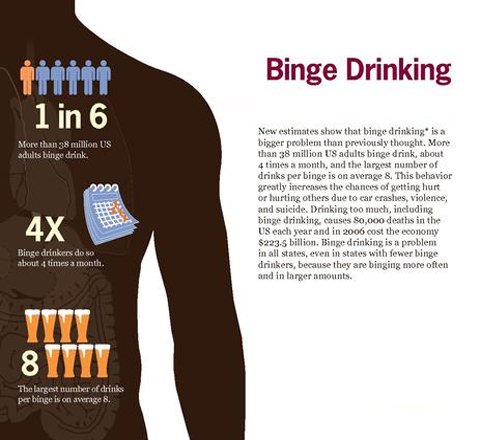There are folks in recovery that don’t relate to the concept of binge drinking or using, much the way I admire but can’t relate to those who have a nasty experience and NEVER drink again. For me, binge drinking adds another layer of complexity that is hard to fully explain unless you deal with this issue. Some famous people have “isolated” events that defy their role model status: Sir Anthony Hopkins, Michael Phelps, Tiger Woods, um Lindsey Lohan?
-
Binge Drinking—SAMHSA defines binge drinking as drinking 5 or more alcoholic drinks on the same occasion on at least 1 day in the past 30 days compared to Heavy Drinking—SAMHSA defines heavy drinking as drinking 5 or more drinks on the same occasion on each of 5 or more days in the past 30 days.
United Kingdom Department of Health even did a study and identified 9 types of binge drinkers! https://www.verywell.com/nine-types-of-binge-drinkers-identified-66594
There is also some interesting science behind why some folks binge drink and others are considered more traditional problem drinkers: https://www.psychologytoday.com/blog/the-athletes-way/201604/the-neuroscience-binge-drinking
I was GREAT at discipline and controlled drinking. I could go days and weeks at a time given a sparklng of motivation. Someone tell ME I have a drinking problem? I’ll show them, no drinking this week. BET me a dollar that I can NOT drink at the party? Your on.
NOT drinking at all was not really a problem. Moderation, temperance, just one or two? NO WAY. I remember arguing with people who swore that I did not have a problem with alcohol. HUH? Most bingers are amazing people in life: disciplined, successful, educated, out going, great family etc. They can go days, weeks even months without using… but when they do…. rut roh!!!
Dynamite, grenades even canned gasoline is not dangerous unless it is ignited. THAT analogy works for ME. A loaded handgun is ok, as long as the safety is on, or one doesn’t pull the trigger.
Binge drinking, using whatever.. really is up to each of us to determine if and when this is a problem that needs to be addressed through a recovery program. Harder still is to decide when one actually stops .. at the end of the NEXT binge, or after some self honesty and contemplation or dealing with consequences of last binge… your call.
Here are some ideas to consider to help deal with Binge Drinking urges:
Triggers: these can be people, places, things, smells that cause one to want to drink. I also have to be mindful of “Hallmark events”like weddings, parties, job events that can be a cause of stress, happiness or anxiety. It helps to keep a log of what triggers you and be prepared to avoid or prevent lapses.
DISARM: (Destructive Images & Self-talk Awareness & Refusal Method) Tell that urge to GET LOST! Some people find it helpful to name that inner voice (mine are my “Brain Critters – angel and demon) and “talking” back to it really helps! It takes the power away from the one way chatter.. Tell that voice to shut up and f*ck off!
Playing The Tape to the End..Spend as much time recalling the aftermath of those first 3-5 drinks/using whatever. Was the brief time you were ‘nicely’ inebriated worth the feelings of despair the next day?Frack it… It’s all so hopeless. Here you are again. Side A is when I drink and all the ramifications involved in my drinking, Side B is when I abstain and all the relief and joy I feel from being sober. The best way I find not to repeat my past is to remember how it was destructive to the real me.
Surfing the Urge: Surfing an urge is letting it do its thing while you are doing yours. ‘Your thing’ is to ‘be present’ with the urge while choosing to do what’s important in your life. Like waves on the ocean, urges build, and crest, and fall. Your job is not to stop this process. Your job is live your life while it is happening.
Moderation: moderation works for some, but for me felt more like way to much work! All kinds of rules that I easily justified breaking “just this once”. Just knowing your weakness, you are prepared. “To many, total abstinence is easier than perfect moderation.” – Saint Augustine
Abstinence Violation Effect: broken promises to ourselves and loved ones lead to self loathing and deeper lapses. We beat ourselves up over that first drink, and turn that into a trip down the rabbit hole. A lapse may lead to uncontrolled use.
PAWS: Post Acute Withdrawal Syndrome, or Protracted Alcohol Withdrawal Syndrome: as a “syndrome” this describes several different effects that one can deal with AFTER initial detox, usually within first few weeks of sobriety. I personally had major sleep issues, mood swings, difficulty thinking clearly, irritable (ie FURIEous) over minor things, and panic attacks out of nowhere. As I read more on PAWS, I do believe many people suffer from this, and also adds to risk of relapse.
https://www.addictionsandrecovery.org/post-acute-withdrawal.htm
The Fix magazine: How to Isolate and Treat Protracted Withdrawal Symptoms ~ PAWS
https://www.thefix.com/content/paws
WIKI How has a great four part series on ” How to Stop Binge Drinking”
wikiHow to Stop Binge Drinking This article has been viewed over 500,00 times and expert reviewed!
Four Methods:
Forming a Plan
Cutting Back Your Drinking
Quitting Altogether
Staying Motivated
http://www.wikihow.com/Stop-Binge-Drinking
Reasons to Stop Binge Drinking.. VeryWell.com has a nice collection of related binge drinking articles:
https://www.verywell.com/reasons-to-stop-binge-drinking-66595
How to Stop Binge Drinking: great article on Binge Drinking – its provided by Recovery.org and has a lot of treatment center ads, but a great read for those wanting comprehensive information:
http://www.recovery.org/topics/how-to-stop-binge-drinking/
The National Institute on Alcohol Abuse and Alcoholism defines binge drinking as a pattern of drinking that brings a person’s blood alcohol concentration (BAC) to 0.08 grams percent or above. This typically happens when men consume 5 or more drinks or women consume 4 or more drinks in about 2 hours.4Most people who binge drink are not alcohol dependent.1
https://www.cdc.gov/alcohol/fact-sheets/binge-drinking.htm
SAMHSA: Substance Use Disorders – The Substance Abuse and Mental Health Services Administration (SAMHSA) is the agency within the U.S. Department of Health and Human Services that leads public health efforts to advance the behavioral health of the nation. SAMHSA’s mission is to reduce the impact of substance abuse and mental illness on America’s communities.
Get the facts on common substance use disorders such as those related to alcohol, tobacco, cannabis (marijuana), stimulants, hallucinogens, and opioids.
The Diagnostic and Statistical Manual of Mental Disorders, Fifth Edition (DSM-5), no longer uses the terms substance abuse and substance dependence, rather it refers to substance use disorders, which are defined as mild, moderate, or severe to indicate the level of severity, which is determined by the number of diagnostic criteria met by an individual. Substance use disorders occur when the recurrent use of alcohol and/or drugs causes clinically and functionally significant impairment, such as health problems, disability, and failure to meet major responsibilities at work, school, or home. According to the DSM-5, a diagnosis of substance use disorder is based on evidence of impaired control, social impairment, risky use, and pharmacological criteria.
